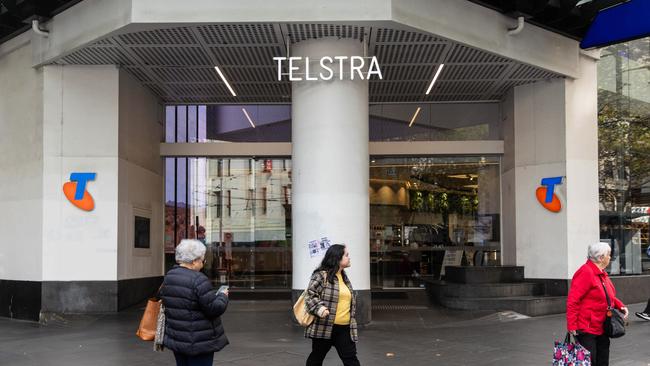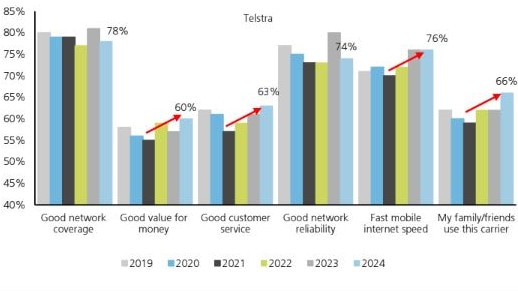Telstra hikes postpaid plans as much as $4 per month
Australia’s largest telco says increases of up to $4 a month for customers on postpaid mobile plans are needed to fund its network investment.

Australia’s largest telco has hiked its postpaid mobile plans by as much as $4 per month just months after the telco removed CPI-linked price rises.
Telstra announced on Tuesday that prices increases ranging from $2 to $4 per month would start on August 27 and said it was a means of managing network investments.
“In making these price changes, Telstra has balanced cost of living pressures it knows some of its customers are experiencing, with its need to continue to invest to manage technology evolution and continued strong customer demand on its mobile network,” the company said.
Its share price surged to a three-month high on the news, and by midafternoon had booked their biggest daily rise since August.
Telstra will soon charge $65 per month, up from $62, for its “basic” postpaid plan which includes 50GB of data, unlimited calls and unlimited texts.
Its “essential” plan, which includes 180GB of data, will rise to $75 per month from $72 and its “premium” plan, which includes 300GB of data, will rise to $99 per month from $95.
The news prices are at least 4 per cent higher on postpaid plans which is larger than the last year-on-year CPI change of 3.6 per cent.

Telstra Group Executive Brad Whitcomb wrote in a blog post on Tuesday that the removal of CPI-linked price increases was to “be more consistent across our products and services” and to simplify the company’s price approach.
“It takes a lot of work and costs to run a mobile network as large as ours, and even more to support the increased usage we have seen on our network,” he said.
“These price changes help us to keep investing in mobile coverage, performance and local support, as well as ongoing investments to improve the security of our services.”
Changes to the price of prepaid mobile plans are also set to rise later this year, with new prices rolled out on October 22.
Telstra’s decision arrives after Optus hiked its postpaid mobile phone plans in May, ditching one of its previous tiers altogether in a move analysts at the time said would provide some relief to Telstra.
Optus upped its plans by $3 from $49 to $52, $59 to $62 and merged its large and extra large plans from $69 and $89 to $82.

Goldman Sachs analysts at the time said the move was a “positive” step for industry after Telstra removed its CPI-linked price hikes last week.
Optus wasn’t expected to increase its prices before November when its new chief executive Stephen Rue was set to start, analysts said.
An Optus spokeswoman told The Australian: “Due to the increasing costs to maintain and provide a great network experience, we’ve made the difficult decision to increase the price of some of our mobile plans.”
When Telstra first announced it would remove its CPI-linked annual price review, its share price sank as much as 7.6 per cent to a near three-year low of $3.39.
On Tuesday, Telstra shares surged 3 per cent to a three-month high of $3.76 on the news and was close to testing its 200-day moving average, now at $3.79, for the first time since February.
It was the biggest one-day rise since a 3.3 per cent jump last August.
The value of shares traded on Tuesday was about 40 per cent above the 20-day average.
As investors scrambled to increase their long exposure and reduce short bets, the number of Telstra call options traded was about double the 20-day average. Call options give the buyer the right but not the obligation to buy shares at a specified “strike” price. Trading in Telstra put options was about 60 per cent below average.
As of last Wednesday the percentage of Telstra shares sold short was 0.45 per cent, near a nine-month high of 0.52 per cent last month.






To join the conversation, please log in. Don't have an account? Register
Join the conversation, you are commenting as Logout